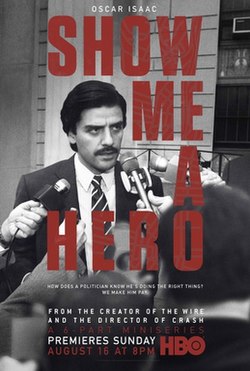Show Me a Hero
| Show Me a Hero | |
|---|---|
 |
|
| Genre | Drama |
| Based on | Show Me a Hero (1999 book) by Lisa Belkin |
| Written by | |
| Directed by | Paul Haggis |
| Starring |
|
| Ending theme | "When the People Find Out" by Steve Earle |
| Composer(s) | Nathan Larson |
| Country of origin | United States |
| Original language(s) | English |
| No. of episodes | 6 (list of episodes) |
| Production | |
| Executive producer(s) |
|
| Location(s) |
Yonkers, New York Puerto Rico |
| Cinematography | Andrij Parekh |
| Editor(s) | Jo Francis Kate Sanford |
| Camera setup | Single-camera |
| Running time | 350 minutes |
| Production company(s) | Blown Deadline Productions Pretty Pictures HBO Miniseries |
| Distributor | HBO |
| Release | |
| Original network | HBO |
| Picture format | 1080i (HDTV) |
| Original release | August 16 – August 30, 2015 |
| External links | |
| Official website | |
Show Me a Hero is a 2015 American miniseries based on the 1999 nonfiction book of the same name by former New York Times writer, Lisa Belkin As in the book, the miniseries details a white middle-class neighborhood's resistance to a federally mandated scattered-site public housing development in Yonkers, New York, and how these tensions affected the city as a whole. The miniseries was written by David Simon and journalist William F. Zorzi – whom Simon worked with at The Baltimore Sun and on The Wire. It was directed by Paul Haggis. Six episodes were ordered by HBO and the miniseries premiered on August 16, 2015.
The story is set between 1987 and 1994 in Yonkers, New York, a city north of New York City in Westchester County, and focuses on efforts to desegregate public housing.
Federal judge Leonard Sand ruled against Yonkers and issued a desegregation order, mandating that public housing for 200 units – possibly scattered-site public housing ("SSPH"), which became the example of new public housing – be built in the middle-class, mostly white, east side of Yonkers. The case and resulting politics resulted in national focus on issues of race, class, and housing. Mayor Wasicsko ran on the platform opposing the judge's order, but before taking office, in the face of the issue being supported by a federal appeals court, became an advocate for desegregation in Yonkers. Wasicsko faced a hostile city council and entrenched public housing leaders opposed to the desegregation. The city of Yonkers was crippled by heavy, possibly bankrupting fines – estimated to be close to $1 million a day from a compounded charge that started at $100 a day – for not following the orders, money Yonkers could not afford. Basic services stopped and parks and libraries were shuttered, with government workers potentially facing mandatory lay-offs. There were protests and Wasicsko and others received death threats, including the sending of single bullets in the mail. Wasicsko was forced to comply. The suit was finally settled in May 2007.
...
Wikipedia
